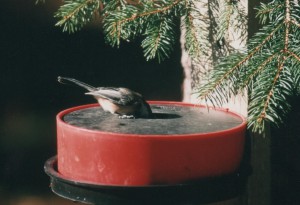Research Data:
Report to Happy Bird Corporation on
Predicted Water Temperatures in the new Solar Sipper
(Model 10040)
Compiled by John Duffy, J. J. Associates, Winchester, MA – 1 June 1998
I have been developing a mathematical model of the thermal performance of solar sippers under various weather conditions. I have also been monitoring the temperatures of solar sippers during winter conditions on the front steps of my house on a number of days. Comparisons of performance of the “old” and “new” sippers have been made as well as predictions as to “How cold can it get before the water in the sippers freezes?” I wish to summarize the results of these measurements and analyses.
 The methodology of the study briefly was: – Develop a mathematical model of the temperature of water in a solar sipper based on principle of heat transfer, taking into account effects of solar irradiation, ambient temperatures and wind, initial water temperature, sipper material properties that affect solar transmission and heat transfer – Adjust some of the thermal parameters in the model so that the predicted temperatures match closely the measured water temperatures on a typical sunny winter day (specifically Feb 6th, 1998) – Use the model to predict the performance of both the “old” (black top and red sides [Model 10008]) and “new” (HDPE clear top and sides with black interiors [Model 10040]) sippers under other simulated weather conditions
The methodology of the study briefly was: – Develop a mathematical model of the temperature of water in a solar sipper based on principle of heat transfer, taking into account effects of solar irradiation, ambient temperatures and wind, initial water temperature, sipper material properties that affect solar transmission and heat transfer – Adjust some of the thermal parameters in the model so that the predicted temperatures match closely the measured water temperatures on a typical sunny winter day (specifically Feb 6th, 1998) – Use the model to predict the performance of both the “old” (black top and red sides [Model 10008]) and “new” (HDPE clear top and sides with black interiors [Model 10040]) sippers under other simulated weather conditions
It is important to point out that the thermal performance of the sipper in reality is a function of many variables. Specifically, on any given day the following can affect the temperature of the water: – day of the year (affects incident sun angles) – geographic location of the sipper (also affects incident sun angles) – degree of cloudiness – degree of shading from external objects (e.g. buildings, trees) – wind speed around the sippers – temperature of whatever is underneath the sipper (ground, wood, air, etc.) – initial temperature of the water – how much water is in the sipper (I would recommend filling to the lip of the lid), and, of course – ambient temperature (which typically varies over the day)
Obviously, if I systematically varied all of the above parameters to find the combinations predicted to result in no freezing of water, the number of such combinations would be very large and difficult to apply for a customer. Even though I have simplified the simulation to keep the results straightforward, it is important to keep in mind the limitations of the results described below.
 In the simulations, I kept all weather conditions as on the day I measured the actual sipper water temperature (i.e. a clear February 6th near Boston with no measurable wind near the sippers) and varied only the ambient temperature until the simulated water temperature reached 32 F. The simulated initial water temperature was 63 F, but the results were independent of the initial water temperature. For the “old” sipper (Model 10008) with a constant simulated ambient temperature of 20F, no freezing took place during daylight hours. For the “new” HDPE sipper (Model 10040), the constant ambient temperature could go down to 14 F.
In the simulations, I kept all weather conditions as on the day I measured the actual sipper water temperature (i.e. a clear February 6th near Boston with no measurable wind near the sippers) and varied only the ambient temperature until the simulated water temperature reached 32 F. The simulated initial water temperature was 63 F, but the results were independent of the initial water temperature. For the “old” sipper (Model 10008) with a constant simulated ambient temperature of 20F, no freezing took place during daylight hours. For the “new” HDPE sipper (Model 10040), the constant ambient temperature could go down to 14 F.
Constant ambient temperatures during the daylight hours are of course very rare and therefore not too realistic. Consequently, I searched a weather database for some recorded hourly weather data to use with the simulation model. The database is called WYEC2, and is available from the National Renewable Energy Laboratory in Golden, CO, and is made up of actual historical weather records with different months from different years pieced together to represent a typical meteorological year. I found the coldest day of the year for Boston (a relatively clear January 12th) and entered the ambient temperatures for the day and adjusted the model clear sky solar irradiation to match the daily total irradiation on the horizontal in the database.
The average ambient temperature during the daylight hours varied from 7 F to 18 F and averaged 13 F. The new HDPE solar sipper (Model 10040) water did not freeze during daylight hours.